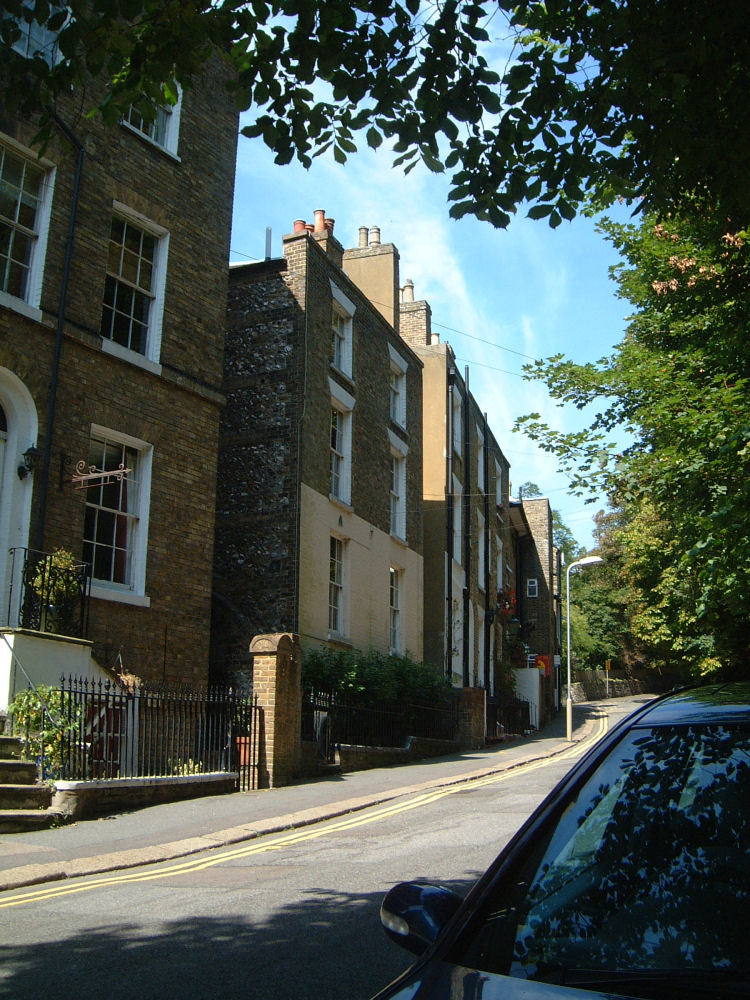|
Laureston Place
Dover

Above picture by Paul Skelton 20 August 2009, shows Laureston Place. The
photo in the centre shows what I believe used to be the "Plough."
|
Closed for misconduct in 1842 but reopened again by Hoile that year. It
traded from 1838 when it was referred to as the "Myrtle Grove," but I never saw it mentioned again after 1844.
I am going to make an educated guess here that the "Grove" became the "Dog
and Gun," and was originally the "Almond Tree,"
reasons being that the name John Stone keep cropping up, although Robert
Wood was mentioned as licensee in 1839-40. However, this house was
definitely close to the house shown in the photo.
|
From the Dover Telegraph and Cinque Ports General
Advertiser, Saturday 7 November, 1838.
POLICE REPORT
The time of the Magistrates was principally occupied on Monday
morning, in the examination of disorderlies, and parties who had
obstructed the police on the previous Saturday night. A dancing-booth in
the garden behind the "Myrtle Grove," in Laurestone Place, seemed to
have been a source of attraction to those who had determined to see the
week out, and thitherward an industrious youth, a collector of cinders
from the furnaces of the steam-packets, was wending his way, at the
watching hour, from the "Oak Tap," where he had commenced the evening
and attained such a degree of excitement, as led him to a variety of
obscene and disturbing exclamations, in his progress through
Castle-street. He was in consequence locked up, although he declared he
was not going to the "Mortal Grove," but having been two
nights in the station, he was charged with an admonition, that another
appearance under such circumstances, would be at the expense of five
shillings, or an opportunity of composing himself for half a dozen hours
in the stocks.
The second case was that of a lady who had indulged in the good
things, and enjoyed the harmony of the "Grove," until she was neither
able or willing to leave it; and when the landlord called in the Police
to clear the house, she behaved so obstreperous, and used such
unlady-like terms, as induced their providing her with cooler quarters
until Monday. She was now discharged with similar intimation to that
given to the preceding prisoner.
A third charge was against a young man, for positively obstructing
the Police called to clear the house. This was at one o'clock on Sunday
morning, when a scuffle ensued, in which one of the Officers lost his
cape. The defendant said he had been in the house but a very short time,
and that he told the Officers he would go as soon as they had cleared
the adjoining room. It did not appear that any blows had been struck,
and he was also excused.
The landlord of the "Grove" was then sent for, and directed to
discontinue the booth, with other intimations relative to the future
conduct of the premises.
|
|
From the Dover Telegraph and Cinque Ports General
Advertiser, Saturday 20 January, 1844. Price 5d.
Owen Cunningham, labourer, aged 29, was indicted for stealing, at St.
James's, Dover, one pair of shoes, the property of John Stone, landlord
of the "Grove" public-house, pleaded Not Guilty. On the evidence of the
prosecutor and other witnesses, the charge was established against him;
but in consideration of its being his first offence, he had the lenient
sentence of two months' imprisonment passed upon him.
|
|
From the Dover Telegraph and Cinque Ports General
Advertiser, Saturday 20 January, 1844. Price 5d.
ROBBERY AT THE GROVE
Mrs. Diplock, wife of the man now in prison for stealing pheasants,
was charged with stealing a tea caddy containing between £40 and £50 in
gold and silver.
Mrs. Stone, the landlady, stated that the prisoner lived as servant
at her house, and that her duty was to attend in the tap-room at the
back of the house. The tea caddy was placed in the bar, which was safe
on Sunday evening about 6 o'clock; but shortly after 8 o'clock she found
it was gone. The ground of suspicion against Diplock was, that about 8
o'clock she was found absent from the tap-room without leave; that on
her return she stated she had been to the "White Horse," and had some
rum with a fisherman; but on making enquiries at that house it was
denied by the landlord and his daughter that any rum had been served to
the prisoner, or to any fisherman at the time stated. It further
appeared there were 8 or 9 men in the parlour, and, it not being
satisfactorily proved that they could not have gained admittance to the
bar, during a temporary absence of Mrs. Stone, the bench decided that,
however suspicious appearances might be, they must, in the absence of
further proof against Diplock, discharge her from custody.
The Mayor observed to Mr. Stone that it was very careless to leave so
much money exposed, he replied, "It was all my wife's fault; but it is
fortunate that I, having had to pay a bill during the week, had for that
purpose taken £20 out of the caddy, or that would have gone too."
|
LICENSEE LIST
WOOD Robert 1839-40

 STONE John 1840-42 (age 35 in 1841
STONE John 1840-42 (age 35 in 1841 ) )
HOILE Benjamin 1842
STONE John 1844+ 
 From the Pigot's Directory 1840 From the Pigot's Directory 1840
|
